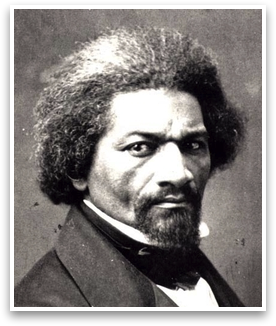
Frederick Douglass
When reading Frederick Douglass's narrative, one cannot help but be struck by his masterful rhetoric, using logos, pathos, and ethos skillfully throughout. Douglass's logic in unassailable. Of course, his painful recollections of his mistreatment and that of his friends and relatives is a strong emotive argument. Furthermore, the strength and beauty of Douglass's prose make his overall argument even more convincing.
And from an educational standpoint, is there any narrative that makes the power of reading and writing more apparent than Douglass's writing? His hunger for knowledge was only surpassed by his hunger for freedom.

Themes and Facts
- For Douglass, the city of Baltimore was nearly a "promised land," where he first learned to read and write as well as first hear of the abolitionist movement.
- Escaped from his "owners" in 1838 and eventually settled in Boston with his new wife, adopting the name "Frederick Douglass" (he never knew his true name, nor his birthday).
- Despite his existence as a slave, Douglass had great faith in the egalitarian philosophy of the United States. Though he heralded the virtues of the Declaration of Independence, he also noted our failure to live up to its ideals.
- A master rhetorician, Douglass shaped his autobiography to fit the needs of the times.
- Not only does Douglass point out the deleterious effects of slavery upon the slaves, he shows how it negatively affects the slaveowners themselves.
Study Questions
- Why is Baltimore such an important place for Douglass?
- What is Douglass's view of education? What were the effects of his literacy on his life as a slave?
- What is the significance of Douglass's "relationship" with Mr. Covey?
- In his preface to Douglass's autobiography, William Lloyd Garrison notes that Douglass "excels in pathos, wit, comparison, imitation, strength of reasoning, and fluency of language." Where do you see specific evidence of these components in Douglass's writing?
"Narrative of the Life of Frederick Douglass" is depository of skillful rhetoric, the author masterfully weaving logos, ethos, and pathos to describe poignantly the evils of slavery for both the slave and master alike.